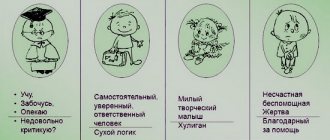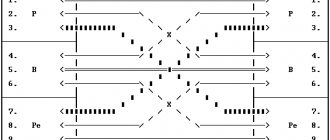Three personality states - parent, adult, child
Why do we sometimes speak to each other as if in different languages? Do we get a response that seems to be not our own response? Or do we unexpectedly react inadequately to innocent remarks? Transactional analysis can answer these questions.
Words play the most insignificant role in communication. The most important thing is the internal mood of each of the participants in the dialogue. Influenced by:
- Our own internal state through the prism of which we perceive communication
- The state of the interlocutor, which we read and react to
Thus, dialogue is always conducted at at least two levels - internal and external. And the main information from it sometimes passes by our consciousness. It is there that the keys to riddles are hidden like: “We were talking calmly, and she suddenly started crying” or “I just asked for help, and he decided that I was accusing him of laziness” and so on.
The answer to how and why this happens is provided by transactional analysis, a psychological model developed by American psychologist Eric Berne. He outlined it in his books on the psychology of relationships: “Games People Play” and “People Who Play Games.”
Three main positions in communication
According to this model, a person always takes a certain position when communicating. And it is she who determines how and to what he will react - and how others will react to him. These positions are called ego states and there are only three of them: parent, adult and child.
- The parent
expresses instilled stereotypes and ideas about life - Adult
– objective and reasonable approach to reality - Child
– spontaneity, creativity and self-expression
A little more detail about each of them.
Ego state "Parent"
The position of a parent is that of an elder. It can be expressed in both negative and positive manifestations. This is care and guardianship, but at the same time - control, coercion and teaching from above. This is a position of “should” and “obligation”, both in relation to oneself and to others. From this state we force ourselves and others to “take and do” something, we teach and explain, and from here we look after, feed, and protect.
A parent is an image of our real parents, which seems to be reflected in the psyche and remains with us forever. Naturally, the properties of this ego state depend on how our real mom and dad behaved with us.
E. Bern gives typical phrases from a parent in his book “Games People Play”: “I know better”, “I’ll explain it to you”, “I’ll help you”, “Who does that?”, “It’s forbidden”, "You must".
Ego state “Child”
Everything here is determined by desires and emotions. This state is characterized by: playful interaction, childish reactions, joy of life, spontaneity, but also fears, resentments and dependence. This is the “I want it, I don’t want it” position, a source of whims and pranks. Spontaneous manifestations, such as creativity, also arise in the child’s state.
A child is a projection of ourselves from childhood. Accordingly, his reactions and positions are the same as ours when we were children.
Typical phrases of a child: “I don’t want”, “I won’t”, “It’s so hard for me”, “Help, I can’t cope”, “You’re always pushing me”, “How wonderful!”, “I want”, “I like it.”
Ego state “Adult”
The position of an adult is the position of common sense, reasonable and adequate interaction. Here a person considers situations and events from the point of view of convenience and benefit, benefit for himself and others, and, importantly, from the position of equality of interlocutors. This is the part of the personality that makes plans, gets results, earns money. As a rule, in this state a person is calm.
This is “our own” part of personality, which is not a projection of us in childhood or a reflection of the image of our parents.
Typical phrases or thoughts: “Let's talk about this”, “I'm sure we'll find the right solution”, “If we go according to plan, we'll most likely work out”, “I believe...”.
How do ego states work?
All three states are very important.
Child functions
– to desire and create pictures of what we want, which will then stimulate us to act; add brightness to life; behave spontaneously and naturally, come up with new things, create, give ideas.
Parent functions
– take care of yourself and others, teach and explain, control what is done, observe social norms and prohibitions, approve and criticize, provide assistance.
Adult functions
– negotiate, adapt, correspond to reality, consider desires, plans and events as a whole from the position of common sense and benefit, act.
For example, how do we achieve our goals? The child sees what he likes and lights up with desire; the adult part evaluates the situation, looks for ways to achieve this, and makes plans. And the parent then controls and tells us - “go ahead, do it, you must”, checks the results, stimulates, reminds. He praises and criticizes, encourages further actions.
Problems of three personality states
The harmonious interaction of our internal ego states ensures the success and prosperity of the individual as a whole - both in business and in relationships. To do this, it is advisable to spend about a third of your time in each of them, effortlessly moving from one to another.
+
Unfortunately, in reality, ego states often function quite differently. One of them may turn out to be excessively strong, the other - suppressed. Most often this concerns the “parent” or “child” states.
Being in such an imbalance, states also “turn on” at the wrong time, forcing a person to behave inappropriately to the situation - for example, being distracted during a work meeting (child) or lecturing her husband when he is not in the mood (parent).
The problem is not only that a person cannot get out of this or that state, but also what kind of state he has. For example, a parent may be too picky, or a child may be fearful or rebellious.
Typical signs of personality imbalance:
- Parent:
criticality, excessive concern for others to the detriment of oneself, hyper-responsibility, inability to rest and relax; - Child:
touchiness, dependence on the opinions of others, irresponsibility, infantilism, inability to concentrate and control oneself, whims.
Let's take a closer look at them.
Parent state problems
Many people know what a harsh inner critic is. For example, you wanted something, and without having time to turn to the adult part of your personality, you immediately “hear” in your head: “Are you crazy?! Where are you!”, “Don’t try it, it’s dangerous!” or even “Fool”, “Loser” and other rude words.
Or another option: a girl began to apply a practice that develops femininity, allowed herself something, bought a beautiful dress, and the critic inside her comments: “Why are you dressed up so much that people will say it’s indecent!”
When we fail at something, it is the parent who scolds us for our failure. Declarative, unsupported beliefs from childhood are also from there.
Another variant of a hypertrophied state, which, as a rule, manifests itself in relation to others, is excessive care and guardianship. This happens especially often in couples when a woman becomes like a mother to a man and cares too much about him.
Important! Let me remind you, just in case, that taking care of yourself and your partner is a normal function of a parent and there is no need to completely abandon it. It is important to maintain balance and be able to switch from one state to another.
Problems of the “child” state
A hypertrophied child is an irresponsible creature who only wants to have fun and have fun, to do what he wants right away. Since there is little control, it is not easy to set big goals: the child only wants to play. Everything is usually fine with desires, but they can constantly change without being fulfilled, because it is difficult for the child to concentrate and pay attention for a long time.
If, on the contrary, there is not enough child in us, we lose the ability to desire, to light up with ideas, to rejoice. A depressed child is a refusal of emotions, which leads to touchiness and demandingness. A person who ignores his childish part is sometimes ready to resist and argue about any issue. To others, this looks like inadequacy, but in fact it is an attempt to balance depressed states.
Touchiness is a typical sign of a rebellious child who always has the feeling that he is being criticized and not appreciated. In fact, it is his own inner parent who criticizes, suppresses and does not appreciate such a person, but it is difficult to realize this. Therefore, pressure is perceived as external. As a result, even the most innocent remarks sound offensive to him. And at the same time, he is constantly waiting for parental support and care, and therefore is very dependent on other people’s opinions, which directly leads us to the topic of self-esteem and its stability.
Swing "Parent-child"
In one and the same personality both the excess of the child and the excess of the parent can coexist, while there is very little room left for the adult. Then a person can be touchy and critical at different moments in life, dependent on other people’s opinions and imposing his own. This is often accompanied by fluctuations in self-esteem and mood - sometimes a perfectionist, sometimes irresponsible; sometimes having fun in the state of a child, sometimes scolding himself for it as a parent.
Problems of the “adult” state
Usually there is only one problem with this condition - there is too little of it. Reasonable and calm behavior and a sound assessment of the situation are not characteristic of everyone. But in reality, each of us is capable of getting into this state - this is a condition for survival. This means that it can be developed and made full-fledged
By observing which of these roles, how and when we dominate – the inner Child, Parent or Adult – we will come closer to the ability to hear ourselves and manage our reactions, behavior, learn to prevent or constructively resolve conflicts in the family, at work, in friendships and love.
After all, each of us is much more than these roles. We are the ones who can consciously manage our roles.
We can become our own directors.
Psychological mirror
The test will help you determine what position you most often occupy and what to do about it.
Test “Parent - Adult - Child” Rate the given statements on a scale from 1 to 10. 1. Sometimes I lack self-control. 2. If my desires interfere with me, then I know how to suppress them. 3. Parents, as more mature people, should arrange the family life of their children. 4. I sometimes exaggerate my role in certain events. 5. It’s not easy to fool me. 6. I would like to be a teacher. 7. Sometimes I want to fool around like a little kid. 8. I think that I correctly understand all the events that are happening. 9. Everyone must do his duty. 10. I often act not as I should, but as I want. 11. When making a decision, I try to think through its consequences. 12. The younger generation should learn from the older how they should live. 13. I, like many people, can be touchy. 14. I manage to see more in people than they say about themselves. 15. Children must unconditionally follow the instructions of their parents. 16. I am a keen person. 17. My main criterion for assessing a person is objectivity. 18. My views are unshakable. 19. It happens that I do not concede in an argument only because I do not want to concede. 20. Rules are justified only as long as they are useful. 21. People must follow the rules regardless of the circumstances. Calculate separately the sum of points for the lines: 1, 4, 7, 10, 13, 16, 19 - “D” (Child); 2, 5, 8, 11, 14, 17, 20 – “B” (Adult); 3, 6, 9, 12, 15,18, 21 – “P” (Parent). Arrange the corresponding symbols in descending order of weight. If you have achieved the “WDR” formula, then you have a developed sense of responsibility, are moderately impulsive, spontaneous and not prone to edification and teaching. You can only wish to preserve these qualities in the future. They will help you in any matter related to communication, teamwork, and creativity. Worse, if “R” comes first, categoricalness and self-confidence are contraindicated, for example, for a teacher, an organizer, in a word, for anyone who mainly deals with people and not with machines. The combination of “RDV” can sometimes complicate the life of the owner of this characteristic. The “parent” cuts the “truth-womb” with childish spontaneity, without doubting anything. “D” at the head of the priority formula is a completely acceptable option, say, for scientific work. Einstein, for example, once jokingly explained the reasons for his scientific success by saying that he developed slowly and thought about many questions only when people usually stopped thinking about them. But childish spontaneity is good up to certain limits. If she begins to interfere with business, then it’s time to take control of your emotions.
So, to summarize, if you
test child parent adult
Other tests for children and adults
Views 295, Today 4
Ego state “adult”.
Verbal signs: the statement expresses an opinion, and not a categorical judgment, expressions such as “thus”, “probably”, “relatively”, “comparatively”, “advisable”, “alternative”, “in my opinion”, “as far as possible” are used. perhaps”, “let’s look at the reasons”, etc.
Behavioral (non-verbal) signs: straight posture (but not frozen); the face is turned to the interlocutor, open, interested; natural gestures in conversation; eye contact at the same level as the partner; the voice is intelligible, clear, calm, even, without excessive emotions.
Ego state "child".
Verbal signs:
a) exclamations: “here you go!”, “wow!”, “God!”, “damn it!”;
b) words of the egocentric circle: “I want”, “I can’t”, “what do I care”, “I don’t know and I don’t want to know”, etc.;
c) addressing others: “help me”, “you don’t love me”, “you will regret”;
d) self-deprecating expressions: “I’m a fool”, “I can’t do anything”, etc.
Behavioral (non-verbal) signs: involuntary shivering, fidgeting, shrugging, shaking hands, blushing, rolling eyes, downcast gaze, looking up; pleading intonation, whining, fast and loud voice, angry and stubborn silence, teasing, gloating, excitement, etc.
Published on our website, the Test for the relationship between Parent, Adult and Child in the personality structure turned out to be very popular and popular in RuNet. In this article we would like to provide some explanations that may be useful in understanding what exactly the test results show and how to interpret the resulting numerical ego state values.Parent, Adult, Child - according to psychotherapist Eric Berne, exists in each of us. We must learn to recognize their voices in order to understand why we behave so differently with other people and why they behave differently with us.
In his therapeutic sessions, Eric Berne drew attention to how the voice, timbre, intonation changes when patients tell their stories: at some point they begin to speak in different voices - sometimes sonorous, reminiscent of children, sometimes stern or instructive, as could the father, dissatisfied with the child's behavior, speaks. Observations of patients and himself led Berne to theorize that the change in voice was associated with the different “I” states (ego states) in which patients were located. The psychotherapist identified three such states and called them Parent, Adult and Child. Then the method of transactional analysis was created, which studies our contacts with other people in different states of our “I”. Eric Berne believed that at every moment of communication with ourselves or with others we are in one of these states: we objectively assess the situation and make decisions like an Adult, we demand or care like a Parent, we fantasize, are capricious or obey like a Child.
Berne called the moments of our communication with others “transactions.” The word "transaction" literally translates as "deal". and if we understand communication as a transaction that should lead to a positive result, it becomes clear why this result is not always as good as we would like. It’s just that the Adult wanted to seriously and thoughtfully discuss the problem with another Adult, but in his place he unexpectedly found an irritated Parent or an offended Child, and they could not agree. Transactions between other ego states of partners may also be invalid.
The three states of our self are not the roles we play. We become a Parent, an Adult or a Child at one time or another, often without realizing it, almost automatically. For some of us, only one of these states is familiar - such people communicate with everyone like obedient children, or, conversely, exclusively like adults, not allowing themselves to play or get offended.
When building relationships from the position of an adult, we are guided by the principles of reality, we know how to find compromises, we are objective, independent and act on the basis of the collected information, and not just our own desires or social regulations.
When the Parent begins to act in a person, this means that the main thing for him at that moment becomes the demands of his own parents, which he heard as a child, or the intonations of other people who were his idols in childhood - this could be a favorite musician or even a literary writer. hero.
Our third hypostasis is the Child. it contains an echo of our childhood: those feelings and needs that we experienced when we were children. The child awakens in us not only in the process of apprenticeship, but also when we talk with our parents - many have noticed that when talking with their father or mother, their voice is higher, louder - the same as it was in childhood. Subordinates who feel like children use the same voice to talk to their bosses - but as soon as they begin to feel like Adults, their real voice “cuts through” in a conversation with the manager.
(For more details, see Method: TRANSACTIONAL ANALYSIS)
All three ego states are necessary for a healthy and harmonious personality. The parental state is responsible for cultural and moral values and beliefs, and is also necessary for raising children. Adulthood is necessary for reasonable and mature judgments and objective processing of information. The childlike state gives the joy of creativity, self-expression, and intuition.
However, how to interpret the test results?
You should pay attention to the relationship of ego states with each other. Although it is obvious that there is no “single correct” distribution option, nevertheless, a number of researchers believe that 2 options are optimal.
In the first case, the ratio of ego states on the egogram represents a situation where the Adult state is most pronounced, and the Child and Parent have slightly less weight and are approximately equal. In the second case, all states are expressed to approximately the same degree.
The situation when the Child or Parent exceeds the Adult on the egogram should not be considered the most successful.
If the Child is the strongest, then there is a possibility that in this case infantile qualities predominate in the personality. Such a person may lack prudence, a sense of responsibility (or, on the contrary, hyper-responsible), and ethical standards (if the Parent is poorly expressed).
If the Parent is the strongest, then there is a high probability that such a person is prone to criticism, stereotypical thinking, excessive conservatism, and also, possibly, overprotection of others.
The main distinguishing features of ego states are summarized in the table below.
Characteristics of ego states
Name
| Main functions | Facial expression | Characteristic vocabulary | Complete dominance of a component while blocking others | |
| Parent | Provides the opportunity to effectively act as real parents. Performs automatic reactions and decisions. Reduces anxiety. Maintains moral and ethical standards. Preserves and transmits cultural traditions. It is a reproduction of the reality of the first 6-8 years of life. | Frown brow, pursed lips, pointing finger, hands on hips, on chest, wringing of hands, gestures of prohibition, refusal. | Charming, son, ugliness, low, vulgar, disgusting, stop once and for all, for nothing in the world, value judgments. | Eradicates everything that resembles childish joy. Lives and acts according to established patterns. We are hostile to any changes. |
| Adult | Performs objective processing of information, calculates probabilities that are essential for interacting with the world and satisfying one’s needs. Regulates the activities of the Parent and the Child, carries out objective mediation between them. Forms “I – Image”. It is a reproduction of experience acquired throughout life. | Constructive, capable, economical. | A rational, objective person. Formally devoid of ethical values and beliefs, incapable of cheerfulness and other manifestations of emotions. | |
| Child | Its spheres are intuition, impulse, joy, charm, imitation, curiosity, teasing, fear, fear, rash actions and everything biological, instinctive. Needs protection and a feeling of security. It is a manifestation of the inner reality of the first 6-8 years of life. | Expression of shyness, cunning, curiosity, fear, smile, laughter. | Exclamations, oaths, curses, interjections. | Gets a lot of joy from life and is not involved in the rational formation and use of resources. Exposed to many dangers. He is not interested in the consequences of his behavior, he just wants to have fun and play. |
Working on ourselves allows us to significantly change the nature of the distribution of ego states in the structure of our personality.
Additional materials:
- Advanced test on transactional analysis (Construction of Dussey's egogram based on the modified Jongward questionnaire)
- Method: TRANSACTIONAL ANALYSIS
- Books on Transactional Analysis
- Transactional Analysis Forum









